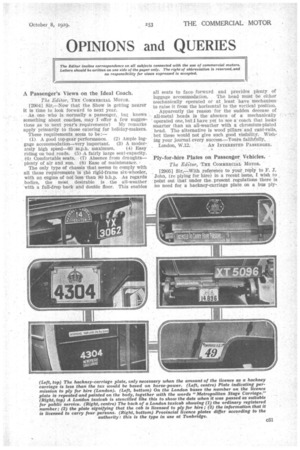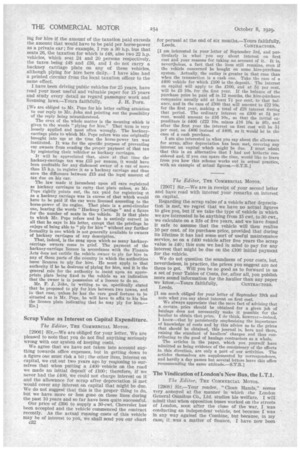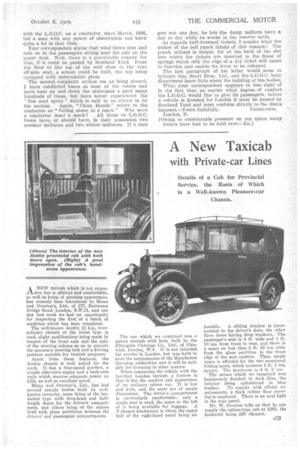OPINIONS and QUERIES
Page 69

Page 70

Page 71

If you've noticed an error in this article please click here to report it so we can fix it.
The Editor invites correspondence on all subjects connected with the use of commercial motors. Letters should be written on one side of the paper only. The right of abbreviation is reserved, and no responsibility for views expressed is accepted.
A Passenger's Views on the Ideal Coach.
The Editor, THE COMMERCIAL MOTOR.
[2904] Sir,—Now that the Show is getting nearer It is time to look forward to next year.
• As one who is normally a, passenger,. but knows something about coaches, may I offer a few sugges tions as to -next year's requirements? :11y remarks apply primarily to those catering for holiday-makers. These requirements seem to be :
(1) A good top-gear performance.. (2) Ample luggage accommodation—very important. (3) A moder
ately high speed-60 m.p.h.maximum. (4) Easy riding on bad roads. (5) A fairly large seat-capacity. , (6). Comfortable seats. (7) Absence from dranghtsplenty of air and sun. (8). Ease of maintenance. The only type of chassis that. seems to comply with all these requirements is the rigid-frame six-wheeler, with an engine of not less than 80 b.h.p. • As regards bodies, the most . desirable is . the all-weather with a full-drop back and double floor. This enables
all seats to facei forward and provides plenty of luggage accommodation. The head must be either mechanically operated or at least have mechanism to raise it from the horizontal to the vertical position.
Apparently the reason for the sudden decease of all-metal .heads is . the absence of a. mechanically operated one, bit I have yet to see a coach that looks smarter than an all-weather with a chromium-plated head. The alternative is wood pillars' and cant-rails, but these would not give such good visibility. Wishing your journal every success.—Yours : faithfully,
London, W.12. . AN INTERESTED PASSENGER.
Ply-for-hire Plates on Passenger Vehicles.
The Editor, THE COMMERCIAL MOTOR.
f29051 Sir,—With reference to your reply to F. .T. John, (re plying for hire) in a recent issue, I wish to • point out that under the present regulations there is no need for a hackney-carriage plate on a bus ply ing for hire if the amount of the taxation paid exceeds the amount that would have to be paid per horse-power as a private car ; for example, I run a 30 h.p. bus that seats 26, the taxation for which is £48, also two 22 h.p. vehicles, which seat 24 and 20 persons respectively, the taxes. being £48 and £36, and I do not carry a hackney carriage plate on any of these vehicles, although plying for hire here daily. I have also had a printed circular from the local taxation officer to the same effect.
I have been driving public vehicles for 25 years, have read your most useful and valuable paper for 15 years and study every detail as regard passenger work and licensing laws.—Yours faithfully, J. H. POPE.
[We are obliged to Mr. Pope for his letter calling attention to our reply to Mr. John and pointing out the possibility of the reply being misunderstood.
The crux of the whole matter is the meaning which is given to the words "plying for hire." That term is very loosely applied and most often wrongly. The hackneycarriage plate to which Mr. Pope refers was one originally brought into use at the time the horse-power tax was instituted. It was for the specific purpose of preventing car owners from evading the proper payment of that tax by registering their vehicles as hackney Carriages.
It will be appreciated that, since at that time the hackney-carriage tax was 115 per annum, it would have been profitable for any dishonest owner of a car of more than 15 h.p. to register it as a hackney carriage and thus save the difference between 115 and the legal amount of tax due on his car.
The law made it incumbent upon all cars registered as hackney carriages to carry that plate unless, as Mr. Pope rightly points out, the tax paid for registering it as a hackney carriage was in excess of that which would have to be paid if the car were licensed according to the horse-power of its engine. That plate is a semi-circular one, hearing the words "Hackney Carriage" and a figure for the number of seats in the vehicle. It is that plate to which Mr. Pope refers and he is entirely correct in all that he says in his letter, except that the privilege he enjoys of being able to "ply for hire" without any further formality is One which is not generally available to owners of hackney carriages of any description.
That, indeed, is the snag upon which so many hackneycarriage owners come to grief. The payment of the hackney-carriage licence in accordance with the Finance Acts does not entitle the vehicle owner to ply for hire in any of those parts of the country in which the authorities issue licences to ply for hire. He must apply to that authority if he be desirous of plying for hire, and it is the general rule for the authority to insist upon an appropriate plate being fixed to the vehicle as an indication that the owner is in possession of a licence to do so.
Mr. F. J. John, in writing to us, specifically stated that he proposed to ply for hire between two towns, and in that case, unless he has the rare good fortune to be situated as is Mr. Pope, he will have to affix to his bus the licence plate indicating that he may ply for hire.— Ea.]
Scrap Value as Interest on Capital Expenditure.
The Editor, THE COMMERCIAL MOTOR.
[29061 Sir,—We are obliged for your letter. We are pleased to note that you do not find anything seriously wrong with our system of keeping costS.
We agree that we have not taken into account anything towards office expenses, but in getting down to a figure one must risk a bit ; the other item, interest on capital, we cut out two years ago by reasoning to ourselves that when putting a /400 vehicle on the road we made an initial deposit of £100; therefore, if we never had the £400, we could not charge interest on it and the allowance for scrap after depreciation id met would cover any interest on capital that might be due. We do not suggest that this is the proper thing to do, but we have more or less gone on these lines during the past 10 years and so far have been quite successful.
Our price of £396 to supply a 30-cwt. Chevrolet has been accepted and the vehicle commenced the contract recently. As the actual running costs of this vehicle may be of interest to you, we shall send you our chart c32 for perusal at the end of six months.--Yours faithfully, Leeds. CONTRACTORS.
[I am interested in your letter of September 3rd, and particularly in what you say about interest on first cost and your reasons for taking no account of it. It is, nevertheless, a fact that the item still remains, even if the vehicle concerned be bought on some hire-purchase system. Actually, the outlay is greater in that case than when the transaction is a cash one. Take the case of a .1400 vehicle for which 1100 is the deposit.. The interest on capital will apply to the 1100, and at 51 per cent. will be £5 10s. for the first year. If the balance of the purchase price be paid off in 12 months, the hire-purchase companies usually add at least 71 per cent, to that balance, and in the case of 1300 that will amount to /22 10s. for the first year, making a total of 128 interest during that period. The ordinary interest on 1300 at 51 per cent. would amount to 116 10s., so that the initial expenditure is £406 (£22 10s. minus 116 10s. is 16), and after the .first year the interest on first cost will be 51 per cent. on 1406 instead of 1400, as it would be in the case of a cash purchase.
I am also interested in what you say about the allowance for scrap, after depreciation has been met, covering any interest on capital which might be due. I must admit that this is an alternative that I had not hitherto considered and, if you can spare the time, would like to learn from you how this scheme works out in actual practice, with an example of actual figures.—S.T.R.1
The Editor, THE COMMERCIAL MOTOR.
12907] Sir,—We are in receipt of your second letter and have read with interest your remarks on interest on capital.
Regarding the scrap value of a vehicle after depreciation is met, we regret that we have no actual figures to give you, but if we take the type of vehicle in which we are interested to be anything from 15 cwt. to 30 cwt., we calculate on a life of five years, and we have found it safe to assume that the vehicle will then realize 10 per cent, of its purchase price, provided that during its lifetime it has had some sort of useful maintenance service, so on a £400 vehicle after five years the scrap value is £40; this sum we had in mind to pay for any interest that might be due on the £100 initial payment for the vehicle.
We do not question the soundness of your costs, but, nevertheless, in practice, the prices you suggest are not there to get. Will you be so good as to forward to us a set of your Tables of Costs, for, after all, you publish more sound information for the haulier than any paper
we know.—Yours faithfully, CONTRACTORS. Leeds.
[I am much obliged for your letter of September 19th and note what you say about interest on first cost.
We always appreciate that the mere fact of advising that a certain price should be obtained for a given job of haulage does not necessarily make it possible for the haulier to obtain that price. I do think, however—indeed, 1 know—that by persistently emphasizing the importance of knowledge of costs and by this advice as to the prices that should be obtained, this journal is, here and there, raising the standard of hauliers' charges and thus contributing to the good of haulage contractors as a whole.
The articles in the paper, which you yourself have admitted as being evidence of the consistency of the efforts in this direction, are only a part of our activities. The articles themselves are supplemented by correspondence, and hardly a day passes but several letters leave this office recommending the same attitude.—S.T.R.] The Vindication of London's New Bus, the L.T.1.
The Editor, THE COMMERCIAL MOTOR.
129081 Sir,—Your reader, "Clean Hands," seems very annoyed at the manner in which the London General Omnibus Co., Ltd. studies his welfare. I will admit that when opposition buses worked on the streets of London, soon after the close of the war, I was conducting an independent vehicle, not because I was in any way against the Combine, but because, in my case, it was a matter of finance. I have now been _ with the L.G.O.C. as a conductor, since March, 1926, but a man with any power of observation can learn quite a lot in that time.
Your correspondent states that wind blows dust and rain on to the passengers sitting near the exit on the upper deck. Well, there is a practicable remedy for that, if it could be passed by Scotland Yard. From the floor to the top of the roof close to the rear . off-side seat, a screen could be built, the top being .equipped with unbreakable glass.
The second complaint strikes me as being absurd. I have conducted buses on most of the routes and have been up and down the staircases a good many hundreds of times, but have never experienced the "fine mud spray" which is said to be drawn in by the suction, Again, "Clean Hands" refers to the conductor as "fooling about in a niack." Why need a conductor wear a mack? • All those on L.G.O.C. buses have, or should have, in their possession two summer uniforms and two winter uniforms. If a man gets wet one day, he lets the damp uniform have a day to dry while he works in the reserve outfit. As regards half-drowned ticketS, I wonder what the maker of the bell punch thinks of this remark ! The punch utilized is unique; for at the back of the slot into which the tickets are inserted is the finest of springs which only the edge of a dry ticket will cause to function and enable the lever to be released.
The last paragraph of his letter would seem to indicate that Short Bros., Ltd., and the L.G.O.C. body crepartment know little about the building of bus bodies.
What your correspondent appears to lose sight of is the fact that,. no -matter what degree of comfort the L.G.O.C. would like to give its passengers, before a vehicle is licensed. for London it must be passed by Scotland Yard and Must conform strictly to the limits
imposed.—Yours faithfully. CONDUCTOR. London, N.
[Owing to considerable pressure on our space many letters have had to be held over.—ED.]




























































































































